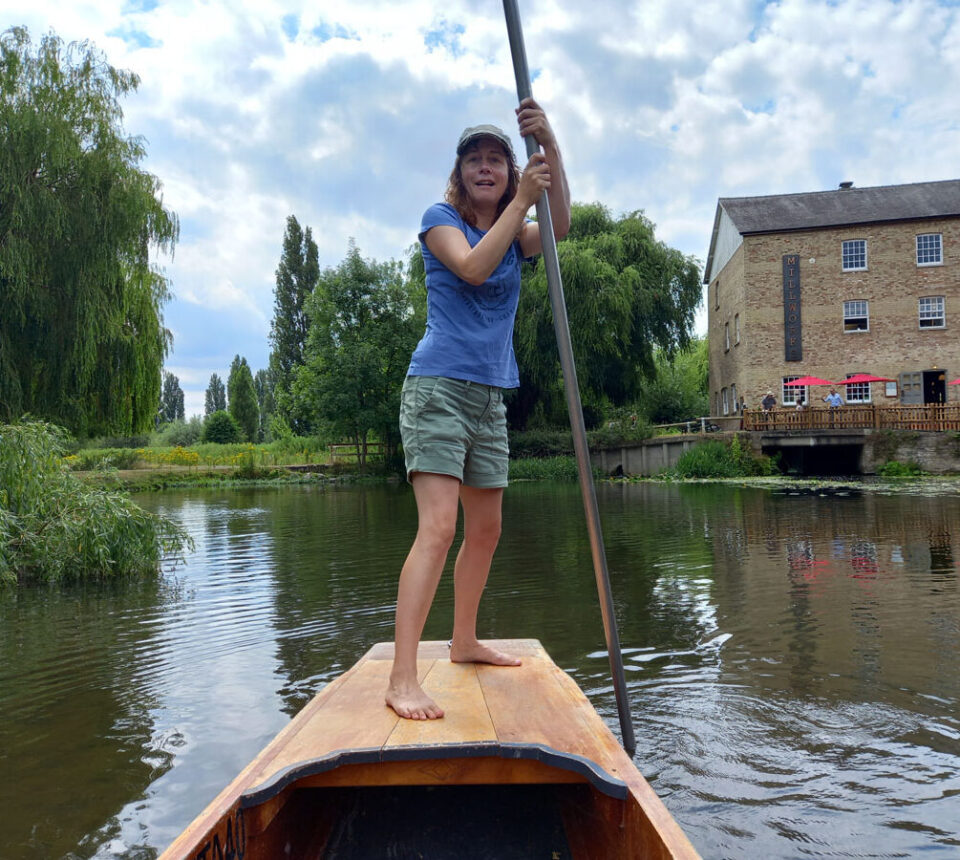Alison Duncan: competition and mutual aid in parasites
Alison Duncan is a researcher in evolutionary ecology at the Institut des sciences de l'évolution de Montpellier(ISEM). To better understand the dynamics of epidemics, she works on interactions between parasites and between hosts and parasites. In 2022, she was awarded the Mariano Gago springboard prize for bilateral cooperation between France and Portugal.

Alison Duncan wonders why she wants to draw his portrait. The CNRS researcher greets us a little incredulously in her office at Montpellier's Institut des sciences de l'évolution. " You can tell from my name that I'm British," she declares with an English accent. And yet, in 2022, she was awarded the Mariano Gago springboard prize for bilateral research cooperation between France and Portugal, along with Flore Zélé of the CNRS and Sara Magalhães, associate professor at the University of Lisbon. Their award-winning work focuses on competition and symbiosis between plant parasites. Alison Duncan is interested in bacterial parasites, mites and other pests. In particular, the effect of competition between parasites on the virulence of attacks.
For pathogens, the generally accepted idea is that there is a trade-off between their level of virulence and their ability to spread widely. A virus that is too virulent, for example, will kill its host and halt its spread. Conversely, a virus that is not sufficiently virulent will be rapidly eliminated. So there's a kind of optimum between the two. " With Sara Magalhães, we wanted to verify this dynamic by observing the transmission of mites on bean leaves", explains Alison Duncan. Initially, the more virulent the mites, the more they spread on the plant. But if their ability to spread stops - in other words, if there are no more healthy leaves nearby - the relationship between virulence and spread reverses. This is due to excessive competition between juveniles, which no longer have the necessary resources to reach adulthood.
The wasp sex ratio
Growing up in Cambridge, where academia is never far away, she's still amazed that she fell into research. A vocation that owes more to an opportunity than a career plan. "I loved my undergraduate placement at Edinburgh University, where I worked on the sex ratio of wasps. I was really intrigued by the fact that they don't always have a 50-50 sex ratio like most species, but can produce offspring that are largely female. It's an oddity", says the researcher, in sympathy with the young student she was. A research engineer position opened up in the lab where she did her internship in 2002. She seized the opportunity, which would lead to her thesis a year later.
For her thesis, Alison Duncan is working on host-parasite interactions using Daphnia magna, small planktonic crustaceans. She is observing how, in the face of a bacterial epidemic, certain specimens that are more sensitive to the parasite prevent the hecatomb by favoring sexual reproduction. In fact, these daphnids have two modes of reproduction, one sexual with eggs that can remain for several months before developing, the other immediate asexual (cloning). "The Daphnia observed laid abundant eggs in spring, in response to the first infected individuals. Our hypothesis is that favoring asexual reproduction will enable their eggs to hatch later, once the epidemic has passed", explains the researcher.
"My baptism of fire
D. in 2006, she went on to complete three post-doctorates in Montpellier, first at the Mivegec unit (Infectious Diseases and Vectors: Ecology, Genetics, Evolution and Control), then at the Montpellier Institute of Evolutionary Sciences. What Cambridge and Montpellier have in common is that they both have highly-recognized universities in evolutionary ecology. " And the southern heat doesn't spoil anything," she says. Every time she applies, she gets a grant for her post-docs. In particular, a Marie Curie grant and a UM grant for intenationals. " I just fit the criteria," says the modest researcher, who obtained a position at the CNRS in 2014.
"I'm working on several other subjects, one of which I'm particularly passionate about, but that's going to take a while, isn't it?" says Alison Duncan. The subject in question is facilitation between parasites in attacking a host. A project with Inrae on tomato plants attacked by both mites and the tomato leaf spot virus. If a plant is infected by the virus, the researchers observe a more rapid development of the mites. We can make two hypotheses, which are not mutually exclusive," explains the biologist. The virus triggers the release of free amino acids in the plant, making it easier for the mites to eat. Or, weakened by the virus, the plant is less able to fight off the mites.
The researcher also teaches. First, during two years of ATER from 2011 to 2013. "It was my baptism of fire for French! I really enjoyed teaching and working with students, even though I was very worried about my language level", recalls the woman who has continued to do some teaching at the university. Having obtained her HDR in 2021, she is now supervising two theses, including one in collaboration with Portugal.
